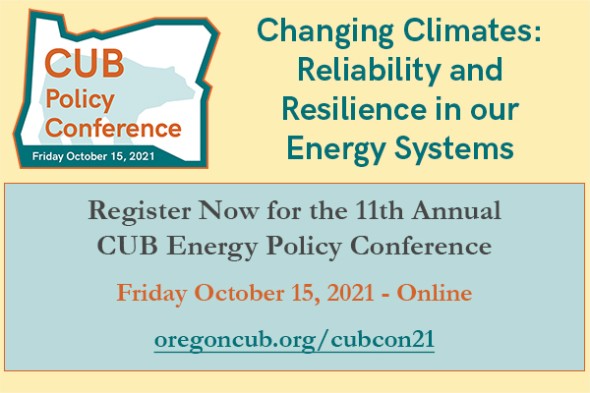2021 CUB Policy Conference Preview - Changed Climate: Challenges to Our Energy Systems
Posted on October 12, 2021 by Bob Jenks
Tags, Conference & Events

CUB’s 11th annual energy policy conference, Changing Climates: Reliability and Resilience in our Energy Systems, is days away. Taking place in a virtual format on Friday October 15, this conference will convene expert speakers and panelists to discuss emerging energy policy issues in the Pacific Northwest. This is the last in a series of previews CUB has posted here on our blog previewing each of the conference’s sessions. Today I’m pleased to introduce the opening presentation, Changed Climate: Challenges to Our Energy Systems, which will set the stage for a panel discussion with utility executives.
When I was born in Portland, the climate was mild. We averaged four days per year when temperatures were above 90 degrees. In the last five years, that annual average has risen to 21. Our climate has changed. Our summers are longer and dryer.
This is true across the state, the region, and the West. We see it in the unprecedented wildfires that have been devastating communities. In 2020, Oregon had as many mega-fires as we did in the entire 20th century. In June 2021, we reached 116 degrees in Portland. The heat wave took the lives of approximately 100 Oregon residents and 500 Northwest residents, many of whom were poorer and did not have access to cooling.
For all the work we have done, greenhouse gas emissions have generally held steady. The runaway effects of this crisis will only become more profound in the years ahead and more people will be harmed, and we are clearly not doing enough.
We have three great challenges ahead with respect to our energy systems:
1. Reliability and resilience
How do we ensure we have enough resources to meet peak loads associated with weather events that are so extreme and unprecedented? We plan for future extreme events by looking at historic extreme events. But the past no longer predicts the future. How do we protect our energy systems from fire, heat, ice, wind, and other extreme conditions?
2. How to ensure that our emissions are actually going down
Oregon’s electric sector has already had some success: our emissions have fallen since the RPS legislation passed in 2007 and further drops are expected as we phase out coal generation over the next nine years. But we have committed to 100% clean electricity. Replacing gas-fired peaking plants will be a challenge. Meeting the winter peak on exceptionally cold days is another. There is not a lot of solar power being generated at 7AM on a winter morning, and it is not unusual for there to be very little wind for several days at a time in the winter.
Transportation emissions are also a big challenge, as they have continued to grow. While there is recognition that electric vehicles offer a path to reducing emissions, Oregon is behind on its goals for electric transportation. And while electric vehicles are a relatively simple option for people with driveways and garages, affordable and accessible charging is a big problem for renters. The challenge of transitioning to electric is even greater for medium and heavy-duty vehicles.
Natural gas is the third highest source of emissions and they have been seeing a slow steady increase since 1990. While renewable natural gas from landfills and dairies is a mature technology, it does not close the required distance on its own. To decarbonize the natural gas sector with RNG will also require commercialization of both thermal gasification technology and green hydrogen. Electrifying buildings is also an option, but it will require us to plan and acquire clean resources that fit with a winter peaking load. It also requires additional transmission to deliver winter peaking renewable power to NW load centers.
3. Equity and affordability
How do we ensure that household energy bills are affordable? How do we avoid adding to the energy burden already disproportionately carried by the most vulnerable members of our communities? And to the extent that the solutions involve new technologies like electric vehicles or heat pumps, how do we ensure that all members of our society are seeing the benefits of these technologies?
I look forward to discussing these issues in my presentation which will open the 2021 CUB Conference. Directly following this, I will moderate a panel of NW utility executives, titled The View From the Top. This panel has become an invaluable staple of the annual CUB conference agenda and I’m pleased to be speaking this year with:
- Larry Bekkedahl - Senior Vice President, Advanced Energy Delivery, Portland General Electric
- Stefan Bird - President and CEO, Pacific Power
- Kevin Christie - Senior Vice President, External Affairs & Chief Customer Officer, Avista Utilities
- John Hairston - Administrator and CEO, Bonneville Power Administration
- Kim Heiting - Senior Vice President of Operations, NW Natural
We are grateful to the generous sponsors whose support makes this event possible, particularly Polar Bear sponsors NW Natural, Pacific Power, and Portland General Electric, as well as Media sponsor Clearing Up.
If you have not purchased your ticket yet, there is still time – registration will close at 5pm on Thursday October 14. I look forward to seeing you there.
To keep up with CUB, like us on Facebook and follow us on Twitter!





10/12/21 | 0 Comments | 2021 CUB Policy Conference Preview - Changed Climate: Challenges to Our Energy Systems